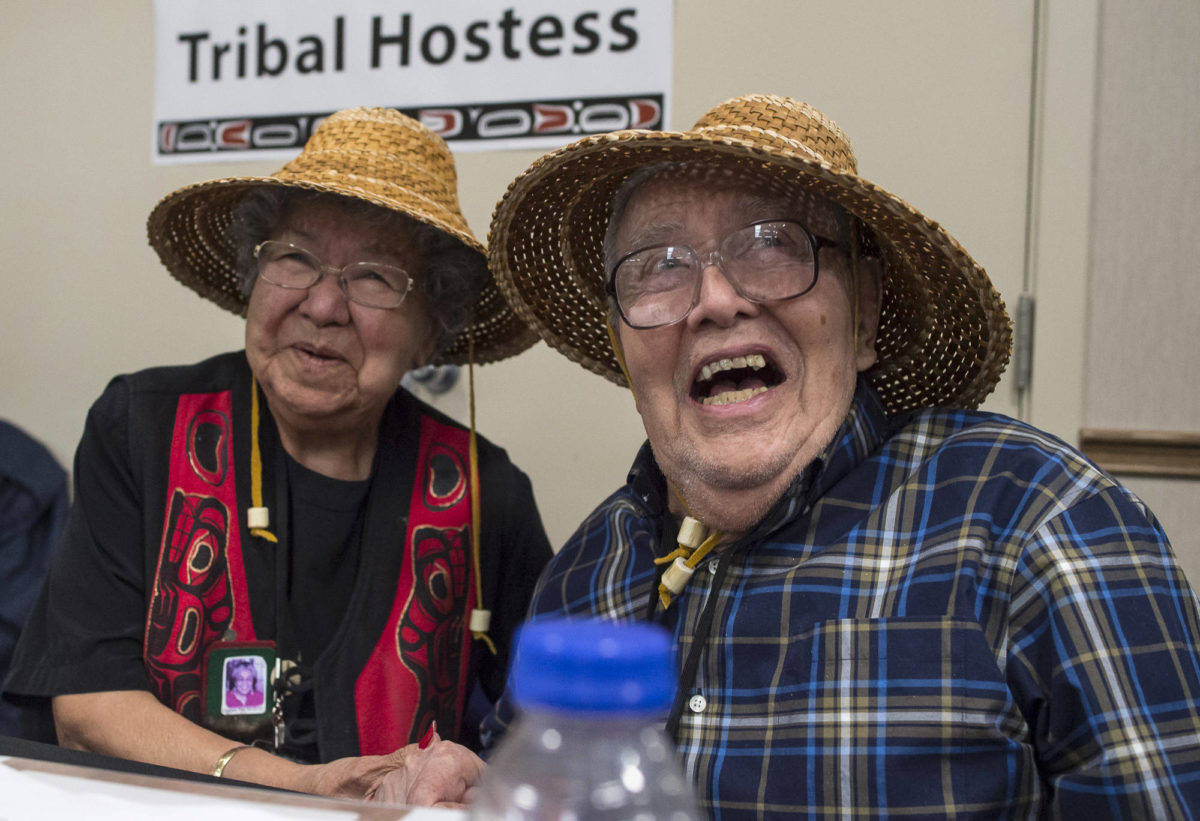In its 84th year, Tribal Assembly is taking a 21st century step.
The annual Central Council of Tlingit & Haida Indian Tribes of Alaska Tribal Assembly starts Wednesday, and the gathering of tribal delegates is planned to be a paperless affair this year, said Helene Bennett, tribal operations and self governance manager and lead organizer for this year’s assembly.
“We ordered tablets for our delegates to update our agenda, load the bio speakers, provide maps, resolutions, kind of everything we would normally have in a paper binder will be transferred over to the tablets,” Bennett said.
Aside from a positive environmental impact, Bennett and Tlingit & Haida President Chalyee Éesh Richard Peterson said the change could have a couple of other benefits.
“In the long run, it will prove cheaper,” Peterson said.
[Alaska Native weaving project honors survivors of violence]
The cost of assembly binders for last year’s Tribal Assembly was about $32,000, Peterson and Bennett said.
“Then staff time to put them together, staff time to distribute them,” Peterson said. “The cost is about the same, but then for two years, my hope is it will end up saving money. The other hope is, we have 110 delegates spread all over the country, and a lot of times communications with them are hard. Our goal is to distribute the pads, then they’ll take them home with them, and they’ll have their own JohnDoe@CCTHITA.com, and they’ll be more informed and we’ll know they’re getting the communications.”
Some help keeping that network of leaders in touch is a good thing, Bennett said.
She said organization for the assembly starts around December and efforts to get ready for the event ramp up as it approaches.
During Tribal Assembly, delegates gather to discuss issues, pass resolutions and approve the year’s budget.
Among the topics Peterson expects to come up are: ferries, health care, the opioid crisis, education and subsistence.
Peterson will also deliver a state of the tribe address, and he said his remarks will highlight some significant programs and a continued financial growth.
“I’ve been preaching economic sovereignty since I was elected president, and so I’ll talk a lot about our business and economic development about creating alternative sources of revenue,” Peterson said. “For me, true sovereignty comes from sustainability and what we can do. While we may operate in $25-$30 million in grants and government programs, my goal is to bring in that much money through our own efforts. So, we haven’t had a history of real success in that area, and we are now.”
The event will also serve as a celebration of culture. A Tsimshian, Haida and Tlingit word of the day will be spoken near the start of each day of the Assembly, and it will open and close with flair.
[Bill would make permanent Alaska Native Heritage Month]
Wednesday’s opening ceremonies and the President’s Award Banquet & Language Fundraiser set for Friday will feature bursts of Alaska Native art. The opening will start at 8 a.m. at Elizabeth Peratrovich Hall and feature Southeast Alaska Native Veterans as a color guard, Xáadaas Dagwíi dance group and a grand entrance of delegates.
The banquet will recognize Marie Olson, Vicki Soboleff, Arias Hoyle, Lyle and Kolene James, Jessica Chester, Gloria Wolfe, Diane Kaplan and Sonya Skan, and include an auction of artwork. Proceeds will go toward supporting Tlingit & Haida’s language efforts.
“We’ve always had the lifetime achievement award, and when I came on, I created the President’s Everyday Hero Awards,” Peterson said. “We have so many people who do so many good things. In my mind it’s a great way to recognize those who don’t get recognized, and at the same time, if I’m looking across the room and I think ‘Man, that Lyle and Kolene, they do amazing things,’ and it’s kind of a motivator.”
• Contact arts and culture reporter Ben Hohenstatt at (907)523-2243 or bhohenstatt@juneauempire.com. Follow him on Twitter at @BenHohenstatt.

